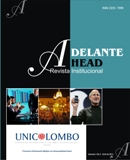A critical-reflective look at the role of the innovative teacher
Resumen
ABSTRACT:
This analysis is relevant to the teacher training process, in those circumstances where teachers wish to bring about a pleasurable encounter between knowledge and students. It is therefore necessary that in each of our classes we implement innovative strategies, in order to generate enthusiasm and motivation in the learners. They, in turn, become interested in what they
are going to learn and explore, investigate and consult so as to foment creativity and production. To this we add autonomy that is encouraged or developed in the students during this process, as well as excellent opportunities for healthy interpersonal relations both in and outside the classroom.
The objective of this analysis was to uncover the innovative teacher's pedagogical methods which allowed us to observe the pedagogical actions of innovative teachers. During the research we observed how some teachers are dynamic and creative, while others are routine and monotonous in their educational tasks. Because of this, some students in the latter group of teachers are disorderly in class, show no interest in asking questions and participating, and do not do homework. This generates low academic performance and discipline problems. On the other hand, students of the teachers that make each class interesting, are well-behaved and participate. They are productive and are eager to learn and do their work.
KEYWORDS:
Teacher, Innovation, Teaching, Learning and Creativity.
Citas
AUSBEL, D., 2000. Psicología educativa: una visión cognitiva, Ed. Trillas, México.
BETANCOURT, Julián. 2010. Revista Electrónica Psicología cientifica.com Méjico. 2.000. Consultado el 5 de septiembre.
BRUNER, J., 2.003. El proceso educativo, Ed. Paidos, buenos aires.
DEWEY, John. 1960. Experiencia y educación, Ed. Losada, Buenos aires.
EINER, E, 1998. El ojo ilustrado, Ed. Paidos, Barcelona.
EYLON, B. and LINM, M., 1988. Learning and instruction . En Review of Educational Research, Fall, vol. 58, No. 3
FLOREZ, R., 1995. Hacia una Pedagogía del conocimiento, Ed. Mc Graw-Hill interamericana, S. A., Bogotá.
GAGNE, R. 1971. Las condiciones del aprendizaje, Ed. Aguilar, Madrid.
JIMÉNEZ, María. 2.009. Cómo ser un profesor innovador. Revista Digital Innovación y Experiencias Educativas. Gr a n a d a . Co n s u l t a d o 0 5 d e septiembre 2.010.
NISBET, R. y otros 1976. Cambio Social. Aliaza Editorial. Madrid
NOVAC, J. y GOWIN, B., 2.008. Aprendiendo a aprender, Ed. F. C. E., México.
SZTOMPKA, P. 1995. Sociología del cambio social. Alianza Editorial. Madrid.
GIROUX, Henry. 1990. Los profesores como intelectuales. Hacia una pedagogía critica del aprendizaje. Madrid Paidos.
PIÑÓN, Josefina. 1.999. La formación del profesor innovador: Un reto del Siglo XXI. Revista Digital de la asociación de pedagogos de Cuba. Cuba.




